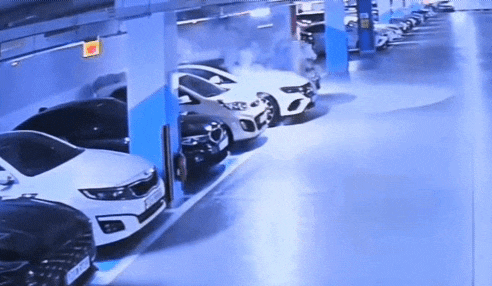[NEWS IN FOCUS]
“I will never buy EVs, and won’t even park my car near EVs,” said Kim Jung-ki, a man in his 50s living in Yongin, Gyeonggi.
Fueled by a recent Mercedes explosion in an underground parking garage in Incheon, Kim joins a growing chorus of potential car buyers in the country fearful of the once-touted vehicle type, a trend that even inspired claims of “EV-phobia” in local headlines.
EVs are increasingly shunned by Korean consumers, with some outspoken in their opposition to EVs entering the parking garages below their residences, offices and commercial buildings.

“EV batteries and charging stations have a high risk of catching fire, which can claim human lives and cause massive damage,” Kim added.
The scenario in which the explosion of just one car damaged 140 vehicles in the garage, 40 of which were totally incinerated, has imposed an even greater sense of fear in many across the country, where more than half of the population lives in apartments.
The decision by Mercedes-Benz, a luxury brand, to use Chinese-made batteries has further disenchanted consumers with the glamor of EVs.
The EV reluctance may be coming at the worst time, as Korea was already suffering a steep fall in EV sales recently with an on-year fall of 4.3 percent to 167,000 last year to become the only country in the world with a year-on-year drop. Global EV sales jumped more than 30 percent.
![Police and fire authorities conduct an investigation on the burnt Mercedes EV on Thursday. [YONHAP]](https://koreajoongangdaily.joins.com/data/photo/2024/08/08/4a946dfc-f720-441d-9a96-05ccf855243e.jpg)
A blazing inferno ignited by a battery
The belief that EVs are more fire-prone crystallizes with the vulnerability of batteries to “thermal runaway,” which can raise the power source’s temperature to up to 1,000 degrees Celsius (1,832 degrees Fahrenheit).
The presence of batteries carries a greater risk of burning nearby objects and causing casualties compared to vehicles with engines powered by gasoline or diesel.
Most EV fires involve lithium-ion batteries that convert chemical energy to electrical energy. When the battery is damaged through abuse or overcharging, it enters an uncontrollable and self-heating state, which is often called a thermal runaway.
“Fires caused by thermal runaway spread fast and may cause a series of explosions, making them very difficult to extinguish,” Park Moon-woo, a researcher at the Korean Institute of Fire Science & Engineering.
Tesla revealed in its own report that EV fires take eight times longer to be extinguished than fires from petrol-powered cars. EVs also need 110 times more water to completely put out the fire and 2.5 times more personnel.
Property loss from EV fires is also around three times higher.
National Fire Agency said the average financial damage caused by an EV fire amounted to around 23.4 million won ($17,000), while it was only 9.52 million won for internal combustion engine cars.
![Electric vehicle chargers are placed in an outdoor parking lot in an apartment complex in Anyang, Gyeonggi, on Thursday. [YONHAP]](https://koreajoongangdaily.joins.com/data/photo/2024/08/08/07a48198-849d-4bc6-9b68-f1179b59c2ec.jpg)
Hostility toward “Made in China” batteries
“How could Mercedes, a so-called luxury brand, use batteries from a Chinese company that we haven’t heard of before for its EQE that costs more than 100 million won?” said Kim Ji-hyuck, a man in his 40s who owns a car from the German brand.
Kim’s furious complaint comes as it turned out that the Mercedes EQE sedan that exploded was confirmed to be topped with batteries made by Ganzhou-based Farasis Energy, the 10th largest battery maker in the world as of last year.
Korea’s hesitance toward Chinese products is nothing new due to the widespread perception that goods from the neighboring country are cheap but lack competitiveness in quality and safety.
Farasis produces nickel cobalt manganese (NCM) batteries, a variant in which Korean battery makers hold a firmer standing. In 2021, China’s BAIC Group recalled around 32,000 models of two different EVs equipped with Farasis batteries, citing battery defects.
“NCM batteries made by Chinese players are known to be around 30 to 40 percent cheaper than NCM batteries by Korean companies,” said an industry source. “But it is an established belief that products from local firms are superior to Chinese products in terms of safety.”
It is reported that there are currently around 3,000 Mercedes cars equipped with Farasis batteries on Korean roads. The Transport Ministry will order recalls if the cause of the parking garage fire is proven to stem from defects in the cars or batteries.
The biggest prejudice
All of this anxiety surrounding EVs may come from a pervasive misconception about their increased flammability: Comprehensive data proves that EVs are less likely to burst into flames than gas-powered vehicles.
EVs had 1.3 fires per 10,000 registered units in Korea as of end of last year, while internal combustion engine cars had 1.9 fires per 10,000 units, according to the latest data from the Science and Technology Policy Institute.
It’s not a problem exclusive to Korea. In the United States, EVs have a 0.03 percent rate of catching fire, while internal combustion engine cars have a 1.5 percent rate, according to the latest report by the U.S. National Transportation Safety Board.
“It’s a really big prejudice that EVs are risker than internal combustion engine vehicles in terms of the number of fire cases,” said Choi Myoung-young, a safety researcher at the Korea Fire Protection Association, in a recent report.
“But the severity dramatically rises in the case of EVs that have high battery capacity,” Choi added.
BY SARAH CHEA [chea.sarah@joongang.co.kr]




